Survey: Sleeping
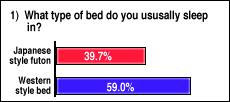 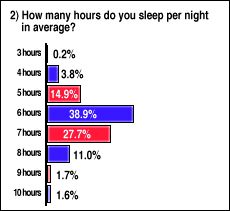 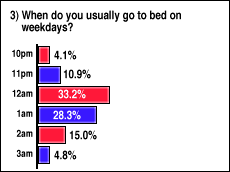 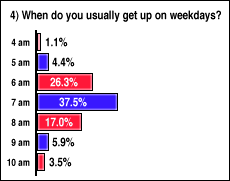 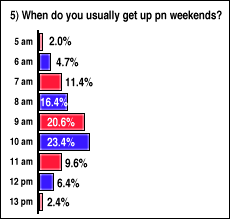 |
First of all, we wanted to find out how popular the Japanese style futon is nowadays compared to the Western style bed. According to our survey results, 59 percent sleep in Western style beds compared to 40 percent who indicated to sleep in Japanese style futons. Surprisingly, a quite large difference between the genders can be observed, with women preferring Western beds more strongly than men: Among women, as many as 67 percent responded to sleep in Western style beds, while only 51 percent of men did so. In case of male company workers, the Japanese futon is with 52 percent even more popular than the Western style bed (48%).
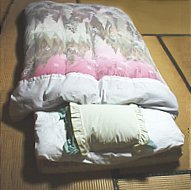
Next, we wanted to find out how long young Japanese sleep in average during the week. According to our survey results, men sleep an average of 6 hours and 20 minutes per night, while women sleep an average of 6 hours and 26 minutes. It could also be seen that students tend to sleep longer than company workers. Male company workers indicated to need the least amount of sleep, averaging 6 hours and 9 minutes, while the average student indicated to sleep for 6 hours and 24 minutes.
In our next questions we wanted to find out at what time the lights are being switched off in the average Japanese home on weekdays. The results of our survey suggests that this happens around 38 minutes after midnight. Men (12.43 am) indicated to go to bed about 10 minutes later than women (12.33 am); and male students stay awake the longest, and in average indicated not to go to bed until 1:01 am.
Our next question asked the survey participants when they usually get up on weekdays. The answers, which could also be calculated by looking at the results of the proceeding two questions, show that the average alarm clock rings at 7.07 am. According to our survey results, the first to get up are female company workers (6.47 am), and the last to get up are male students (7.28 am).
Finally, we wanted to find out until what time the average young Japanese sleeps on weekends. The answer suggested by our survey results is 9.05 am. Also, as many as 10 percent indicated not to get up until noon. The results show a quite large difference between the genders, with men (8.50 am) indicating to get up half an hour earlier than women (9.19 am) in average. Again, male students indicated to stay in bed the longest, and not to get up until 9.53 am in average. Students in general (9.38 am) indicated to sleep longer on weekends than company workers (9:08 am).
Good night!
Questions? Ask in our forum.